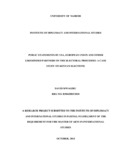| dc.description.abstract | The use of public statements during Kenyan elections by foreign governments and their
diplomatic missions has been growing in Kenyan, especially since the 2003 General
Elections. However, this became even more evident following the 2007/2008 post
election violence and the run-up to the 2013 General Elections. Indeed, public diplomacy
has been used by foreign missions in Kenya and in particular foreign missions affiliated
to the West to influence Kenya’s domestic political agenda in the run-up and after
General Elections. Matters traditionally thought to be internal such as elections, are
increasingly becoming concerns of the international community. Especially as many
states are members of the United Nations or have signed and ratified international treaties
that bind them to international obligations. This became even more evident in the run-up
to the 2013 General Elections, as a major Kenyan Presidential and Deputy Presidential
candidate faced trial at the International Criminal Court. Some state parties to the Rome
Statute with Foreign Missions in the country used Public Diplomacy, especially public
statements to urge the Government of Kenya and the people of Kenya to respect its
international obligations to the Court as a state party to the Rome Statute. The study set to
explore the implication of public statements in Kenya by western states in particular, the
USA, European Union and other like minded partners on the country’s electoral
processes. The researcher wanted to understand whether public statements by western
foreign missions influenced the Kenyan Elections with an emphasis on the 2013 General
Elections but looking in detail at the period 2007-2013. The study was carried out in
Mathare Slum area A4 and AC which experienced violence following the 2007 General
Elections. The study revealed that public statements by foreign governments and their
diplomatic missions do influence domestic political agendas however at different levels.
At the grassroots the public statements may not have as strong an impact as they do at the
national level. | en_US |

